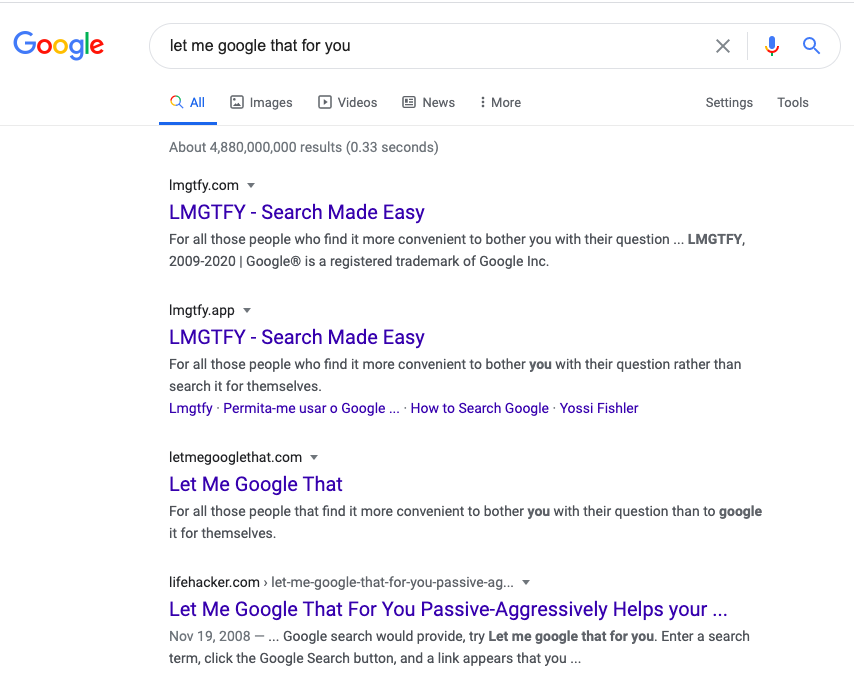
I first heard the initialism LMGTFY when my sister (Hi, V!) told me a story about somebody's asking her for an easily findable piece of information. Tell the truth, when you first encountered the term, LMGTFY, did you look it up yourself or ask someone about it? I almost asked her what it meant, but then decided to figure it out on my own. Phew!
In general, I like being able to do things on my own. I appreciate the independence of hopping into my car to go where I want, when I want to. I like knowing how to cook some of the foods I enjoy and knowing where to get the others. Maybe most of all, I value that when I don't understand something, I know how to learn it. I know what to type into a search engine and how to find books in a library. When I'm confused, I don't have to rely on others to unconfuse me. (If "unconfuse" isn't a word, shouldn't it be?)
Our school had us all watch the Netflix documentary The Social Dilemma, which I found fascinating. I highly recommend it, if you haven't seen it already. It helped me to connect some thoughts I've had about our recent election, our national polarization, and our increasingly docile relationship with the world around us.
We are becoming both more polarized and more helpless, a dangerous combination. We rely blindly on the first or loudest information we get, unquestioningly believing everything we read on the Internet, even though almost none of it is vetted the way material for print publication must be. More problematic than not being vetted, it's actively tailored to control us. Remember that if you're not paying for it, you're what's being bought.
Google isn't free. Facebook isn't free. Instagram isn't free. Twitter, Pintrest, Houzz, TikTok -- not one of these is free. Sometimes, we can easily see what "they" are trying to plug, but other times, "they" work in subtle ways.
So the question comes up, how do we know what we know, and what do we count as knowledge? (That's a little Humanities humor for those of you who know Hotchkiss's program or have walked the English Wing in recent years.) But seriously, how can we know what to believe, whom to trust, how to figure things out on our own?
I've come up with only one answer: primary sources. Instead of watching Fox's or CNBC's commentary on the debates, I watched the debates and then turned off my stream. I can make my own decisions about the words that come out of candidates' mouths.
How do you know that you're getting an unbiased version of events? Is there such a thing as an unbiased version? What sources do you trust? How can you figure things out on your own? Please share some ideas in the comments.
I think if “unlearn” is a word, “unconfuse” should also be a word.
And since I’ve unlearned so much, I’ll take it. I hope I’ve unconfused a few kids in my career.
Hugs, c
Oh hi C!
Our parents were very good at teaching us how to find answers instead of giving them to us. I think they may also have been particularly good at teaching us how to ask questions. I like that your blog starts with a question but ends with others at least as often as it answers its title.
V
Thanks, and thanks for inspiring this one.